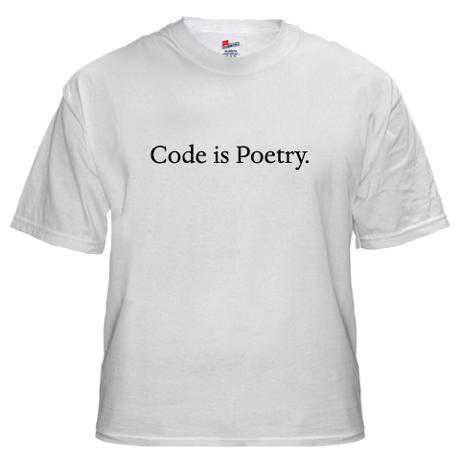For more than 2 years I have been intrigued by the tee I got from WordCamp Indonesia 2010. It has a line on its back, “Code is poetry.”
On many websites I found, “Coders write.”
Huh? What the heck are they talking about?
I often watch my fiancee, Ibnu, coding on a text editor. Well, I cannot comprehend his codes. On which plane of existence are they regarded as writing pieces?
Why do coders claim that they write when they, in fact, code? Coding is not writing, is it?
I threw this question on Twitter. My friends, mostly web developers and game programmers, immediately replied.
Now it starts to make sense. Writers communicate with the readers through a set of words in structured sentences, regulated by grammar, to express comprehensible thoughts and ideas. If we use such definition for coding, it means:
Coders use programming languages as Perl, PHP, Ruby on Rails, etc, while we use human languages as English, Spanish, Chinese, etc. They are called languages because they serve as communication methods. Coders use their languages to talk to the computers, we use our languages to talk to other human beings.
Coders use a set of symbols known as codes, while we use a set of symbols known as words.
In order to attain an effective communication with the ‘readers,’ coders follow certain set of rules; in human languages we call it syntax. Why? Because they need the computers to understand what they are ‘saying’; in human languages we call it semiotics.
Okay. I get it. Coders do write.
However, I still cannot totally understand the self-claim, “Code is poetry.”
Matt Ward wrote on Smashing Magazine explaining the codes-poetry metaphor, but I see that all of his points about codes–presented in indentation, having meaning, having purpose, being structured–are actually recognizable in any writing form, not only poetry. He forgot to mention some natures about poetry: emotional, ambiguity and illogical.
Щ(ºДºщ)
He also believed that poetry, as well as codes, should have been trim and efficient. If that was the point his opinion was based on, well, here are several other writing forms trimmer than poems:
- Tagline
- News ticker
- Radio ads script
Poetry, if I recall what I learned in college correctly, is a writing form that emphasizes on the aesthetics of language using verses and rhymes, sometimes conveys words in different meanings*, and thus evokes emotional responses from the readers.
*My teacher once said,
Poems could be more illogical and ambiguity-provoking than proses.
Well, codes are all about logics, are they not? When you talk to the computers, effective communication should be emphasized more than aesthetics, amirite? If those codes are translated ambiguously by the computers, what would happen?
Unless the computers can cry and laugh reading their codes, these coders should really stop saying and acting as if they were Shakespeare or Gibran.
And, if coders are really in need of finding metaphoric relationship between codes and a human language’s writing form, here is my suggestion: THESIS. Both find problems and solve them using clever, simple, clear logical solutions, leaving out ambiguity as much as possible.
But, of course, if you disagree with me, just write on the comment box. Do you really believe code is poetry? Why? I would love to know.

Care to share your amazing thought?